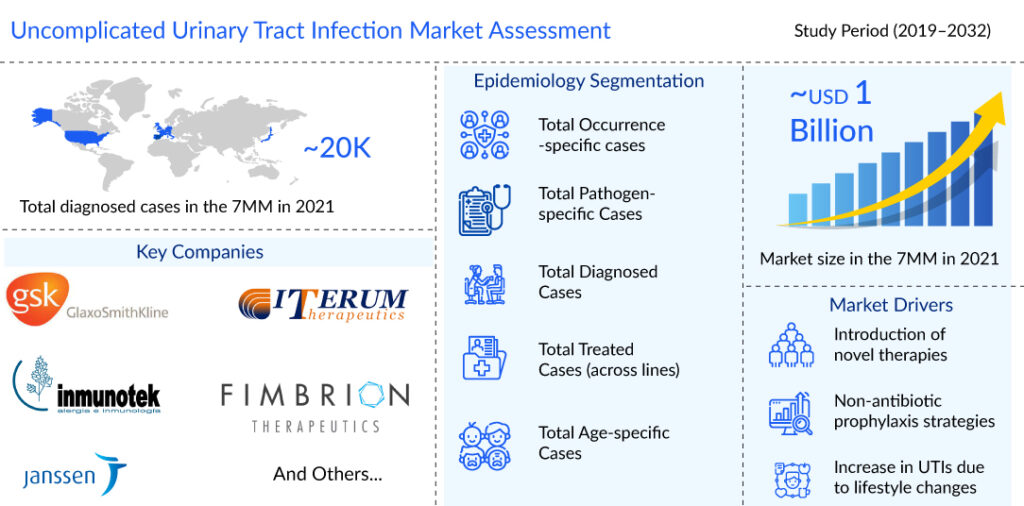Uncomplicated UTI Treatment: Challenges and Opportunities in the Market
Jan 23, 2023
Table of Contents
Urinary tract infection (UTI), also known as acute cystitis, is an infection in any part of the urinary system, including the kidneys, bladder, ureters, and urethra. It is one of the most common infections in local primary care, and UTIs are among the most frequently encountered infections in the outpatient setting. After respiratory tract infections, they are the most common reason why antibiotics are prescribed. The incidence of UTIs in adult males aged under 50 years is low, with adult women being 30 times more likely than men to develop a UTI.
It has been categorized into complicated and uncomplicated urinary tract infections. It typically affects individuals who are otherwise healthy and have no structural or neurological urinary tract abnormalities; it is very common in women. Approximately 11% of women over 18 years’ experience at least one episode of uUTI per year.
Downloads
Article in PDF
Recent Articles
- GSK Is All Set To Launch Respiratory Syncytial Virus Vaccine… Now Who’s Next?
- Eli Lilly’s COVID-19 Antibody trial; Approval for Oriahnn; Gilead’s Remdesivir Clinic...
- Notizia
- Respiratory Syncytial Virus Treatment Market: A Complex Space Worth Billions!
- Orchard licenses gene therapy tech from GSK; Glympse raises $46M; FDA voted to recommend Terlipre...
DelveInsight’s Uncomplicated Urinary Tract Infections epidemiological analysis demonstrated that the total occurrence-specific uUTI cases, in 7MM, in 2022 was approximately 36K, which is expected to increase at a CAGR of 1.0% by 2032 due to lifestyle changes and an increase in Escherichia coli infection.
What does the diagnosis and uncomplicated UTI treatment landscape look like?
Uncomplicated UTI diagnosis is made through urine culture, urinalysis, and culturing of the clinical sample in the clinical laboratory. According to the current literature, only 50% of the population is diagnosed. There is a challenge of delayed diagnosis due to the sample transport to the laboratory and the time required for bacteria to grow on culture media. The results are typically delayed by two to three days from sample acquisition and are sometimes inaccurate. Due to this lengthy process and inaccuracy in diagnosis, there is an increase in the recurrent patient pool. Thus, there is an urgent need for more accurate and logistically feasible uncomplicated UTI diagnosis techniques.
What are the currently available uncomplicated UTI treatment options for patients?
Currently, uncomplicated UTI patients are managed on antibiotics. The goal of antimicrobial therapy is to eliminate the infecting organisms from the urinary tract and resolve symptoms. The uncomplicated UTI treatment is well recommended in the guidelines issued by the American Urological Association, European Association of Urology (EAU) Urological Infections, National Institute for Health and Care Excellence, and other geography-specific organizations.
Antimicrobial agents most commonly used in the first-line treatment for uncomplicated UTI include fluoroquinolones, nitrofurantoin, sulfonamides, fosfomycin, cephalosporins, and others. These agents are primarily used because of their tolerability, spectrum of activity against suspected uropathogens, and favorable pharmacokinetic profiles. For patients with recurrent disease, fluoroquinolones remain the mainstay uncomplicated UTI treatment option. Postmenopausal women are recommended hormone replacement therapy.
As per DelveInsight estimates, the total uncomplicated urinary tract infections market size in the 7MM accounted for approximately USD 1.0 billion in 2021. Fluoroquinolones and fosfomycin alone contribute to 50% of the uncomplicated UTI treatment market, and cephalosporin and nitrofurantoin are the other major contributors.

Challenges with current uncomplicated UTI treatment
Empirical use of antibiotics contributes to misuse and over-use of antibiotics, resulting from unnecessary or inappropriate antimicrobial therapy, participating in the recent rise in bacterial resistance. In fact, for people with symptoms of UTI and bacteriuria, the main aim of uncomplicated UTI treatment is the relief of symptoms, but in case of unsuccessful uncomplicated UTI treatment, it causes alteration of urinary tract microflora, leading to an increased risk of clinical adverse events, including infections with multi-drug-resistant organisms and the development of antibiotic-resistant UTI.
Infections caused by multi-drug-resistant pathogens, such as extended-spectrum beta-lactamase (ESBL) and carbapenemase-producing Gram-negative bacteria, methicillin-resistant Staphylococcus aureus (MRSA), and bacteria resistant to broad-spectrum antibiotics, such as fluoroquinolones and cephalosporins, are indeed increasingly recorded among UTI and are the cause of a serious challenge to the public health system.
What is the unmet need for the current uncomplicated UTI treatment market?
There is a huge diagnostic and treatment unmet need in the uncomplicated UTI treatment market. Novel diagnostic techniques with higher accuracy and faster output are needed for early diagnosis of the disease.
For about approximately one-third of the uncomplicated UTI patients who develop recurrent disease, there is a lack of effective and safe uncomplicated UTI treatment options. Fluoroquinolones, prescribed in ~60–70% of the recurrent patients, are associated with severe adverse events. In May 2016, the US FDA advised that serious side effects associated with fluoroquinolone use “generally outweigh the benefits for patients with acute sinusitis, acute bronchitis, and uncomplicated urinary tract infections who have other treatment options.”
The upcoming market for uncomplicated UTI treatment
The current scenario is anticipated to shift toward the upcoming uncomplicated UTI therapies. As uncomplicated UTI is a volume-driven market, in the US alone, around 14–15 million women have at least one episode of uncomplicated UTI, and there is a high unmet need in this space. There is an urgent requirement for new uncomplicated UTI treatment options in the recurrent pool (~in 30–35% uUTI cases), where we have minimal uncomplicated UTI treatment options. According to the WHO, there is a serious lack of new antibiotics for uncomplicated UTI treatment due to the growing threat of antimicrobial resistance. Therefore, the new therapies will have more opportunities and less uncomplicated UTI treatment market competition. GlaxoSmithKline, the key emerging player, has stated that the development of Gepotidacin (GSK2140944) can be crucial in response to the rising bacterial resistance to fluoroquinolone drugs such as ciprofloxacin. Like fluoroquinolones, gepotidacin acts on the bacterial enzymes gyrase and topoisomerase IV, but details of its interaction with these enzymes are unknown.
|
|
|
|
|
|
|
|
|
|
|
|
Apart from the above, other key players like Janssen Pharmaceuticals are developing ExPEC Vaccine (ExPEC10V and ExPEC4V) in PI/II trial, and GlaxoSmithKline/Fimbrion Therapeutics is developing GSK3882347 in PI for the uncomplicated UTI treatment.
The uncomplicated UTI treatment market in 7MM is expected to witness a major change in the study period 2019–2032. As per a recent analysis by DelveInsight, the uncomplicated UTI treatment market is expected to achieve approximately USD 3,500 million revenue in the seven major markets (the United States, Germany, France, Italy, Spain, UK, and Japan) by 2032, with expected approvals of the emerging uncomplicated UTI therapies.
What will be the major challenges in the uncomplicated UTI treatment market?
The blockbuster antibacterial drugs, such as azithromycin, ceftriaxone, ciprofloxacin, levofloxacin, were introduced over the last 20 years, many of which are now off-patent and have become even lower priced, and this will pose significant price pressure on the upcoming emerging uncomplicated UTI therapies. Payers and insurance bodies will try to limit drug usage with mediocre efficacy and high price.
In a nutshell, a few potential uncomplicated UTI therapies are being investigated for the management of uncomplicated UTI, and it is safe to assume that the future of this uncomplicated UTI market is bright. Eventually, these drugs shall create a significant difference in the uncomplicated UTI treatment landscape in the coming years.

FAQs
Urinary tract infection (UTI) is the most common bacterial infection caused by various pathogens, but most commonly by Escherichia coli, Klebsiella pneumoniae, Proteus mirabilis, Enterococcus faecalis, and Staphylococcus saprophyticus. It has been categorized into complicated and uncomplicated urinary tract infections.
Currently, uncomplicated UTI patients are managed on antibiotics. The goal of antimicrobial therapy is to eliminate the infecting organisms from the urinary tract and resolve symptoms. The uncomplicated UTI treatment is well recommended in the guidelines issued by the American Urological Association, European Association of Urology (EAU) Urological Infections, National Institute for Health and Care Excellence, and other geography-specific organizations.
The most commonly prescribed antibiotics in the uncomplicated UTI treatment market include the combination drug trimethoprim and sulfamethoxazole, trimethoprim, β-lactams, fluoroquinolones, nitrofurantoin, and fosfomycin tromethamine.
Uncomplicated UTI diagnosis is made through urine culture, urinalysis, and culturing of the clinical sample in the clinical laboratory. According to the current literature, only 50% of the population is diagnosed.
Leading companies such as GlaxoSmithKline, Iterum Therapeutics, Inmunotek, Janssen Pharmaceuticals, Fimbrion Therapeutics, and others are currently developing novel therapies for uncomplicated UTIs.
Downloads
Article in PDF
Recent Articles
- Virus, the Cancer Therapy of the Future
- FDA Grants Orphan Status to MDL-101 for LAMA2-CMD; Pfizer’s ABRYSVO Approved for High-Risk Adults...
- Atreca secured $125M; OncoResponse bags $40M; Kodiak Sciences’s IPO; Biodesy contemplates $20M
- Business CockTail
- Respiratory Syncytial Virus Treatment Market: A Complex Space Worth Billions!



